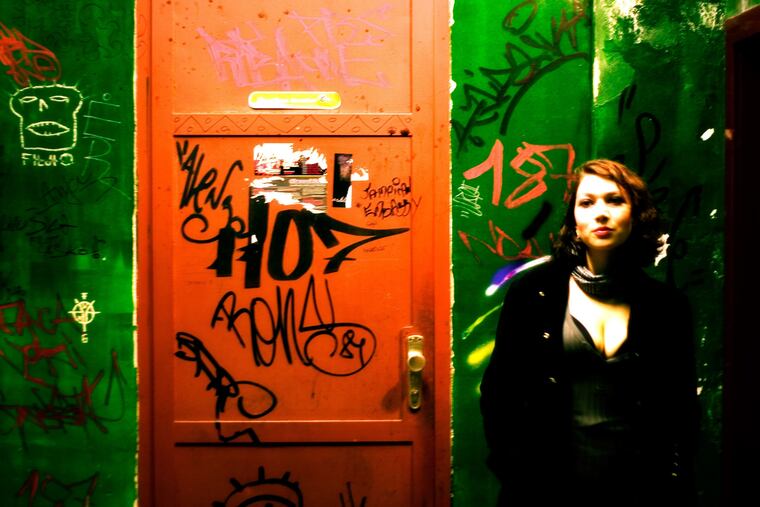‘We’ve always been here’: A Q&A with Nanticoke and two-spirit editor, Sarah Clark
Clark is the editor in chief of several digital magazines and journals, including ALOCASIA, a queer plant-based journal.

Maybe you are better at killing your own plants than properly nurturing them. But one Philly-based online publication still hopes they grow on you.
Sarah Clark, a Philadelphia resident, is the founder and editor in chief of ALOCASIA, a free journal dedicated to storytelling through the lens of plants and queerness. Clark also is the editor in chief of two other digital publications, ANMLY and beestung.
They are a member of the Nanticoke tribe, and trace their family lineage back through Sussex County, Delaware, from before it even became a state. Clark also identifies as disabled and two-spirit, a phrase used by some Indigenous people to describe their nonbinary gender identity.
Clark spoke with The Inquirer over email about ALOCASIA, their literary and cultural influences, how nonbinary gender identity is not a new phenomenon, and what makes plants such a great storytelling tool.
This conversation has been edited and condensed for clarity.
How did you first get interested in writing and literature? Who were and are your influences?
My very first word was “book.” It’s a corny answer, but it’s true. Reading them, writing them, making them — words have always been my passion. The Moderns were my first idols and influences. I wanted to write like Eliot, edit like Hemingway, and think like Stein. (And I don’t think I’ve done any of those three!) But getting out of books and into the real world, I started becoming more cynical about the old Western canon.
Now, I’d say my influences are Ai, Layli Long Soldier, Diana Nguyen Khoi, K-Ming Chang, George Abraham, Nikki Wallschlaeger, Diane di Prima, June Jordan, and Bernadette Mayer. And probably too many others to name.
ALOCASIA combines two things, plants and queerness, in unexpected ways. What makes plants a good mechanism for telling interesting human stories? And if someone was interested in checking out ALOCASIA, what’s a good piece to start with?
Plants are cool little dudes. They’re so alive, they do the most unexpected things — they’re beautiful, they’re unusual, they want to live more than anything else — they’re just like us. In Native traditions, I always felt like we’ve seen ourselves reflected in the nonhuman natural. A lot of that turned inward as we became more isolated as a planet during the beginning of the pandemic. It doesn’t surprise me that indoor gardening and caring for houseplants became such a popular way to spend time, and to survive, frankly.
“Plants have long been a favorite topic for writers both literally and metaphorically.”
Plants have long been a favorite topic for writers both literally and metaphorically. We invest so much in their care, we invent meaning, we give them as gifts, and use them as memorials. Plants allow us to share vulnerabilities we might not otherwise be able to.
I recommend people read Chen Chen’s “Set the Garden on Fire,” since it was one of his tweets that inspired me to start the journal.
In your online bios, you identify as Nanticoke and two-spirit. How do those parts of your Indigenous identity shape who you are as an editor/writer and how you approach your work?
Being Nanticoke and two-spirit have shaped my entire life. They are inseparable and indelible parts of who I am and how I see and have learned to think about the world. They influence all of my editorial practices and all of my ethics. They’re baked into how I want to make the world a more welcoming place for those often left out of the conversation.
» READ MORE: Pictures from Indigenous Peoples Day at Bartram's Garden
As part of the settler-colonial “project,” missionaries erased (or tried to erase) our languages and cultures, and with that, our understandings of gender and sexuality. Indigenous scholars, activists, and everyday people have been and continue to work towards recovering what was lost.
There is a false idea that being trans or nonbinary is new, but there’s documented proof that we’ve always been here and we’re always going to be here. For my part, I don’t consider myself a man, I don’t consider myself a woman, and I feel like I can and want to place myself in the legacy of the traditional gender roles in my tribe, precontact.
What’s your favorite plant?
The anthurium warocqueanum. The dark green velvety leaves veined with sparkling silver blister [variegation] is a living work of art, but damn hard to keep alive! And I like a challenge.